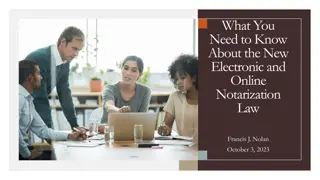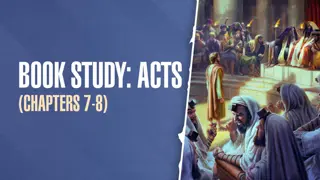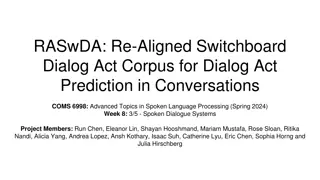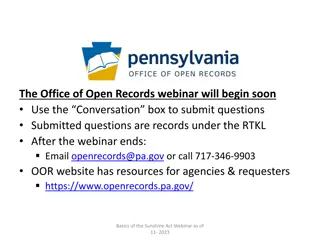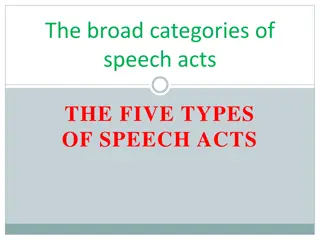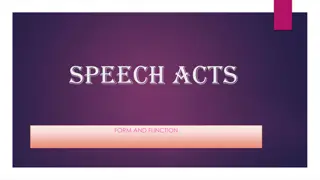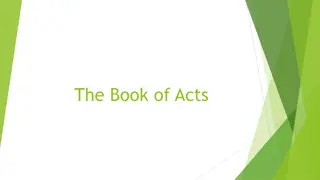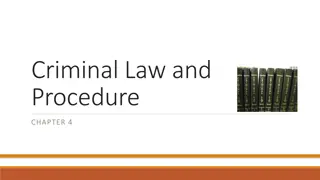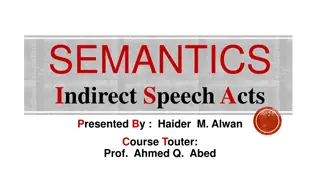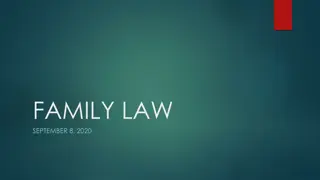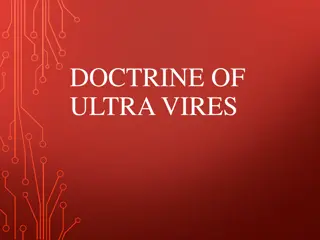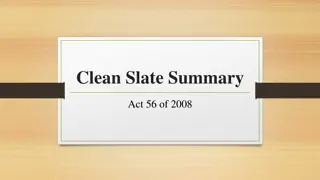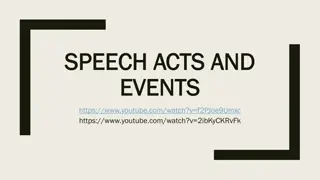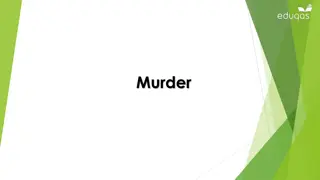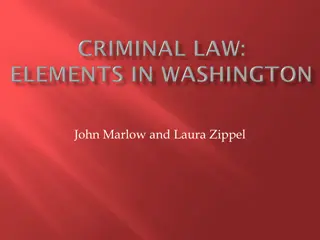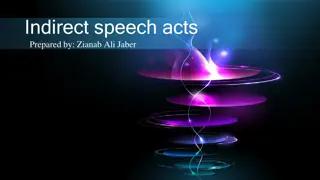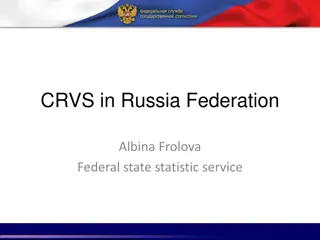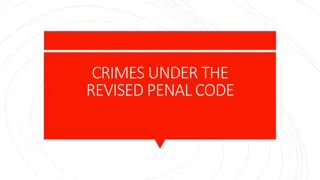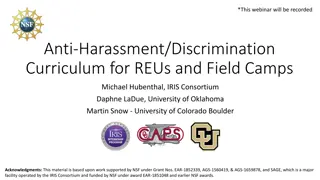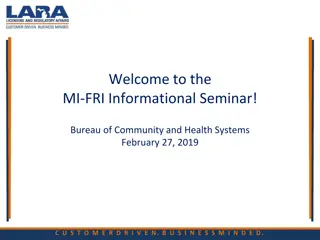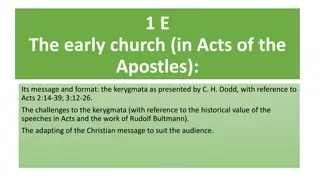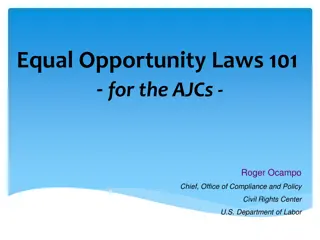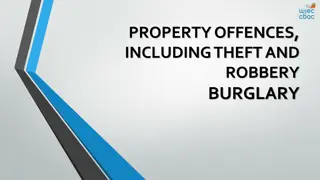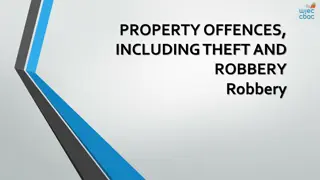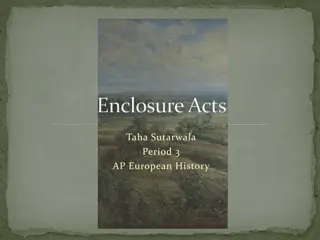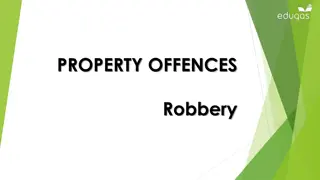Understanding Puberty and Religious Obligations After Maturity
Upon reaching maturity (Buloogh), individuals must fulfill compulsory acts of worship and adhere to laws of modesty, including covering the Satr. Signs of puberty vary for boys and girls, with cleanliness being emphasized in Islamic teachings through practices like Istinjaa. Failure to maintain puri
4 views • 73 slides
Pragmatic Analysis of Directive Verbs in Progressive Relaxation
In this study, the Enaction Model and Impositive Strategy are applied to analyze the directive speech acts in Progressive Relaxation, a technique used in hypnosis. The research uses qualitative methods to examine the scripts and classifies the directive speech acts based on specific models. Previous
3 views • 9 slides
Colonial Acts and Conflicts in American History
Key historical events such as the French & Indian War, the Proclamation of 1763, and the Quartering Act are explored, shedding light on critical laws, conflicts, and tensions that shaped colonial America. The discussion covers acts imposed by the British government, the impact on settlers and Native
5 views • 15 slides
Understanding the New Electronic and Online Notarization Law
The article explores the evolution of notarial acts, including Remote Online Notarization (RON), Electronic Notarization, and considerations for Unauthorized Practice of Law (UPL). It discusses the challenges and opportunities presented by electronic and remote notarization methods, as well as insig
1 views • 24 slides
Insights from Acts Chapter 7: Promises, Responses, and Divine Encounters
Delve into the profound revelations in Acts Chapter 7, exploring Stephen's response, God's promise to Abraham, the significance of timing (chronos and kairos), the transformative experiences of Moses, and the powerful messages on resisting the Holy Spirit and encountering the Triune God.
0 views • 26 slides
Understanding Dialog Acts in Spoken Language Processing
Dialog acts encompass the communicative function and semantic content in conversations, influencing cognitive states and context. They have multiple realizations and interpretations, impacting dialog systems' language generation and recognition processes. Dialog acts play a crucial role in spoken di
0 views • 16 slides
Embracing Giving Back: Enhancing Well-being Through Acts of Kindness
Giving back to the community by creating dignity bibs for care home residents not only benefits others but also enhances well-being. Small acts of kindness and support can provide a sense of purpose and happiness, promoting mental health. Dignity bibs, resembling clothing, allow individuals to maint
0 views • 6 slides
Understanding Pennsylvania's Open Records and Sunshine Acts
Explore the ins and outs of Pennsylvania's Open Records and Sunshine Acts, which aim to ensure transparency and accountability in government operations. Learn about the rights of the public, covered entities, and what constitutes a public meeting. Access valuable resources for agencies and requester
1 views • 17 slides
The Five Categories of Speech Acts Explained
Speech acts are divided into five categories: Verdicatives, Exercitives, Commisives, Behavitives, and Expositives. Verdicatives involve giving a verdict, Exercitives give a decision on a course of action, Commisives involve committing to an obligation, Behavitives are used in communication activitie
1 views • 10 slides
Understanding Speech Acts and Politeness in Linguistics
This informative content explores the concepts of speech acts, including direct and indirect speech acts, and the role of politeness in communication. It highlights how speakers convey intentions through their utterances, distinguishing between different speech acts such as requesting, commanding, a
1 views • 11 slides
Understanding Criminal Behavior from a Social Psychological Perspective
This unit delves into the application of social psychology in the legal system, exploring the nature of criminal behavior, responses to criminal acts, the criminal justice system, and rehabilitation. It examines the social ecological perspective of criminal acts and outlines key points related to th
0 views • 50 slides
Understanding the Coptic Orthodox Church through the Book of Acts
The Coptic Orthodox Church's practices and beliefs are highlighted through various passages from the Book of Acts. Discussed are the importance of sacraments, fasting, almsgiving, hymns, intercession, and the seven sacraments including Baptism, Confirmation, Confession, Eucharist, Matrimony, Holy Or
0 views • 11 slides
Understanding Criminal Law and Procedure: Greenvisor's Case
A case study involving embezzlement by Joe Greenvisor, the chief accountant of Nobreath Corporation, sheds light on criminal acts, duties, intent, and societal perspectives on crime. Despite Greenvisor's charitable intentions, his actions constituted a crime under the law. The elements of criminal a
0 views • 47 slides
Understanding Indirect Speech Acts in Semantics
Speech acts can be direct or indirect, with indirect speech acts relying on implicature rather than literal meaning. This concept can lead to confusion, especially in cross-cultural communication. Explore the theories of J.L. Austin and John Searle regarding speech acts and performative utterances,
1 views • 16 slides
Evolution of Family Law: From Divorce Acts to Society's Changes
Explore the evolution of family law through Divorce Acts and societal changes over the past 50 years, analyzing shared jurisdiction, grounds for divorce, and the impact of the Divorce Act of 1968 on social norms and family structures.
0 views • 29 slides
Understanding the Doctrine of Ultra Vires in Company Law
The doctrine of ultra vires in company law pertains to acts that are beyond a company's legal powers or authority as stated in its memorandum of association. This concept categorizes acts as ultra vires the directors, articles of association, or the company itself, with implications such as void con
1 views • 11 slides
Overview of Sealing Misdemeanor Convictions under Acts 56 of 2008
Under Acts 56 of 2008, certain misdemeanor convictions can be sealed following specific criteria and timeframes. The process involves Petition-Based Sealing and Automated Sealing, each with its rules and exclusions. While some convictions qualify for sealing after meeting conditions, others are excl
0 views • 8 slides
Development of Indian Penal Code (IPC) 1860 and Its Impact in British India
The Indian Penal Code (IPC) of 1860 was introduced in British India after a series of historical events led to the need for a comprehensive criminal justice system. The disintegration of the Mughal Empire paved the way for British takeover, resulting in variations in criminal laws across different B
1 views • 24 slides
Understanding Speech Acts and Events in Communication
Speech acts and events play a crucial role in communication by impacting how utterances are interpreted. Speech acts such as apologies, compliments, complaints, and invitations are performed through utterances, with the locutionary act producing linguistic expression, illocutionary act conveying com
0 views • 30 slides
Understanding Murder in Common Law
Murder, as defined in common law, is the unlawful killing of a human being with malice aforethought. This act involves both actus reus (unlawful killing caused by the defendant) and mens rea (intention to kill or cause grievous bodily harm). Legal causation, including thin skull test, chain of causa
0 views • 18 slides
Understanding Criminal Elements and Intentions in State Laws
The prosecution needs to prove all elements of a crime beyond a reasonable doubt, including Mens Rea (mental intent) and Actus Reus (criminal act). Each state has its laws defining specific crime elements, sentences, and degrees of seriousness. Examples include arson, assault with intent, and unlawf
0 views • 17 slides
Managing Participant Support Costs for Undergraduate Research Experiences (REU)
Participant support costs for REU programs include stipends, travel allowances, and registration fees for non-employee participants. The Uniform Guidance outlines guidelines for allowable costs, while NSF provides stipend guidelines. Institutions like Brown University have specific procedures for st
0 views • 6 slides
Understanding Criminal Defenses and Legal Concepts
Explore the intricate realm of criminal defenses, from Mens Rea to Actus Reus, and delve into various defense strategies such as alibi, excuse defense, defense of self, property, and others. Uncover the nuances of legal concepts like infancy and not criminally responsible excuses in the context of c
2 views • 19 slides
Understanding Indirect Speech Acts in Communication
Indirect speech acts involve utterances that appear as simple statements but are intended to convey a different meaning such as requests or commands. This form of communication can be seen in various cultural contexts, requiring the listener to interpret the intended illocutionary force behind the w
0 views • 12 slides
Civil Registration of Acts in Russia
Civil registration of acts in Russia is governed by key legislation including Federal Law No. 143-FZ and involves the state registration of various events such as birth, marriage, divorce, and death. Bodies responsible for registration are formed by public authorities of the Russian Federation, with
0 views • 24 slides
Understanding Theft Offences: Elements and Case Law
Theft offences, including theft and robbery, are defined under the Theft Act 1968. A person is guilty of theft if they dishonestly appropriate property belonging to another with the intention to permanently deprive them of it. The elements of theft involve actus reus (appropriation) and mens rea (di
0 views • 26 slides
Understanding Direct Bribery and Public Official Offenses
Bribery of public officials under the Revised Penal Code, specifically Articles 210 to 212, involves direct, indirect, and qualified bribery. Direct bribery encompasses acts where a public officer agrees to perform or abstain from acts in exchange for gifts, promises, or considerations. Offenses inv
0 views • 35 slides
Anti-Harassment/Discrimination Curriculum for REUs and Field Camps
This curriculum addresses the need to educate individuals in REU programs on recognizing, responding to, and reporting harassment and discrimination. It emphasizes interactivity and practical resources to foster a culture of change in scientific workplaces. The material is supported by NSF grants an
0 views • 29 slides
MI-FRI Informational Seminar and MI-ACTS/LTCPP Development Overview
MI-FRI Informational Seminar hosted by the Bureau of Community and Health Systems highlighted the development and improvements of MI-ACTS/LTCPP, aiming to streamline Facility Reported Incidents submissions. The MI-ACTS/MI-FRI workgroup collaborated since 2014 to enhance the system's efficiency and u
0 views • 18 slides
Understanding Communicative Acts on Social Networking Sites
Exploring the taxonomy of communicative acts on social networking sites, this work delves into the impact of design features that influence speech acts, commitment, and normative pressures online. By analyzing common families of communicative acts on SNSs, the research sheds light on how these platf
0 views • 29 slides
Reflections on Catholic Education and Mercy in Light of Acts 17:15-18:1
Today's celebration of the Eucharist focuses on Catholic Education Week and emphasizes the call to love as people of mercy. Reflecting on the Acts of the Apostles passage, we are reminded of God's omnipotence and our identity as His offspring, called to seek and worship Him without idolatry. This se
0 views • 25 slides
Understanding Colonial Acts and Proclamations in Early America
Explore the series of acts and proclamations that shaped the relationship between colonists and the British Empire in early America. Learn about significant events such as the Proclamation of 1763, Navigation Acts, Sugar Act, Quartering Act, and Stamp Act, and understand why these measures sparked a
0 views • 18 slides
Early Church Message and Format in Acts of the Apostles: Kerygmata by C. H. Dodd
The early church's message and format in Acts of the Apostles, particularly focusing on the kerygmata as elucidated by C. H. Dodd, with references to Acts 2:14-39 and 3:12-26. Explore the challenges to the kerygmata and the adaptation of the Christian message to various audiences. Additionally, insi
0 views • 17 slides
December Daily Acts of Kindness for the Holiday Season
Spread joy this December by engaging in daily acts of kindness and festive activities. From decorating the Christmas tree to sharing a cup of tea with a loved one, each day offers a unique opportunity to bring cheer and goodwill to those around you. Embrace the spirit of the season with baking, play
0 views • 13 slides
Understanding Equal Opportunity Laws and Civil Rights Acts
This content covers the importance of enforcing equal opportunity laws and civil rights acts to promote justice and equality in various aspects of society, such as employment, programs receiving financial assistance, public accommodations, and education. It delves into the mission of the Civil Right
0 views • 46 slides
Understanding Burglary Offences and Acts Reus in Property Crimes
Burglary is a serious property offence outlined in the Theft Act 1968, with distinct elements and penalties. The actus reus of burglary involves entry as a trespasser into a building with intent to steal, cause harm, or damage property. Differentiating between the offenses under section 9(1)(a) and
0 views • 11 slides
Understanding Robbery: Elements, Definition, and Distinctions
Robbery, defined under Section 8 of the Theft Act 1968, involves the act of stealing with the use of force or threat of force. This offense carries serious consequences, including a potential life imprisonment sentence. The key elements of robbery include the actus reus of theft and force, along wit
0 views • 11 slides
Impact of Enclosure Acts on European History
Enclosure Acts in the United Kingdom led to the privatization of common land, marking a significant shift in English agriculture and society. Large-scale farmers and aristocrats capitalized on consolidation, leading to the loss of land for small farmers and disruption of the traditional agrarian way
0 views • 22 slides
The Power of Friendship: Acts of Kindness and Support
In a world where someone cares, friendship holds immense power. Through acts of kindness, gentle touches, words of encouragement, and unwavering support, true friends demonstrate the essence of companionship. As highlighted in Acts 9:1-19 and John 15:15, the transition from servants to friends signi
0 views • 10 slides
Understanding Robbery: Elements and Distinctions
Robbery, as defined in Section 8 of the Theft Act 1968, involves the act of stealing accompanied by the use of force or the threat of force to instill fear in order to commit the theft. This offense is considered more serious than theft and can lead to a life imprisonment sentence. The key elements
0 views • 11 slides



